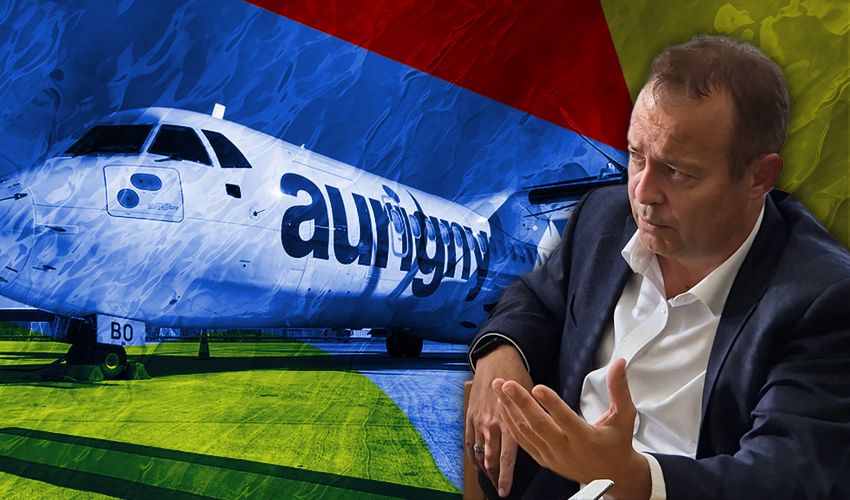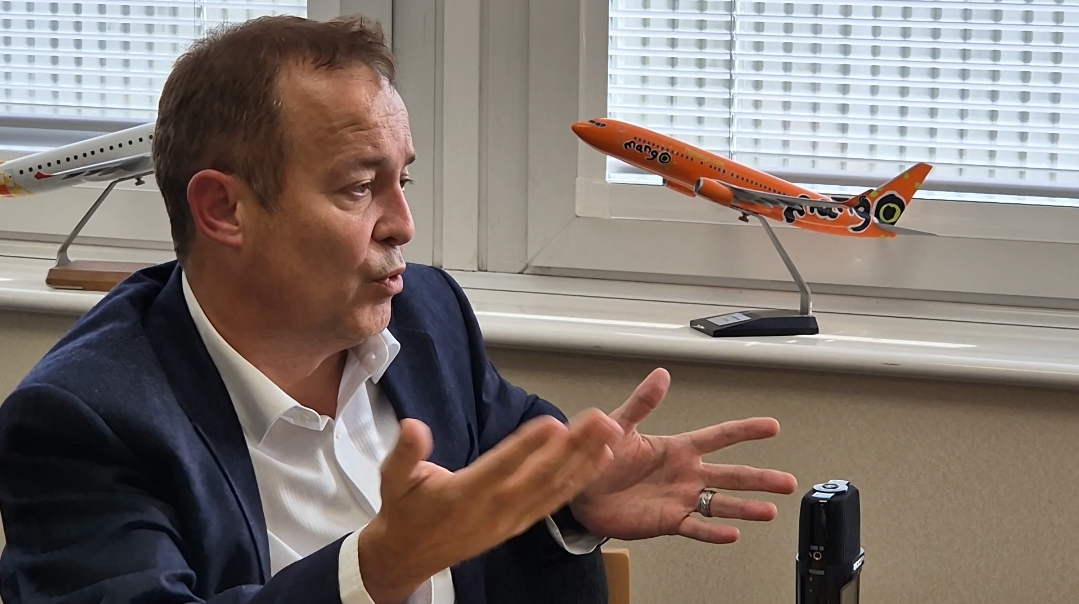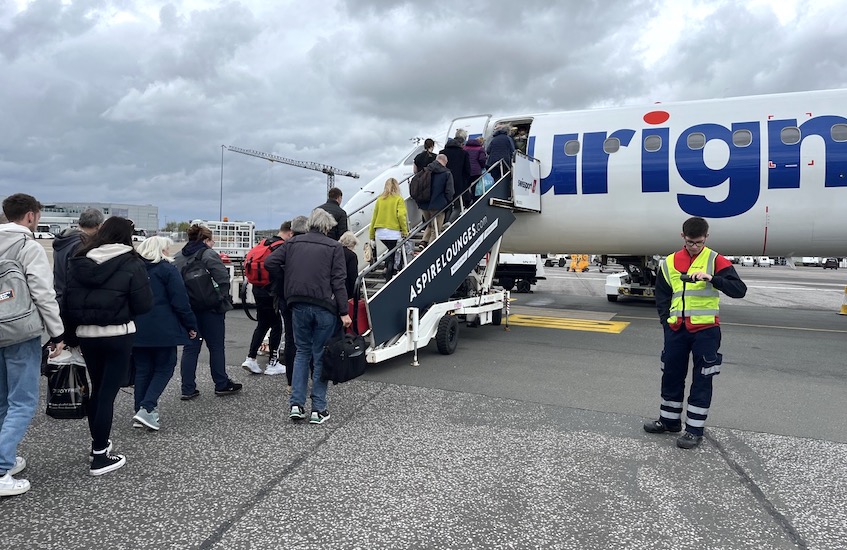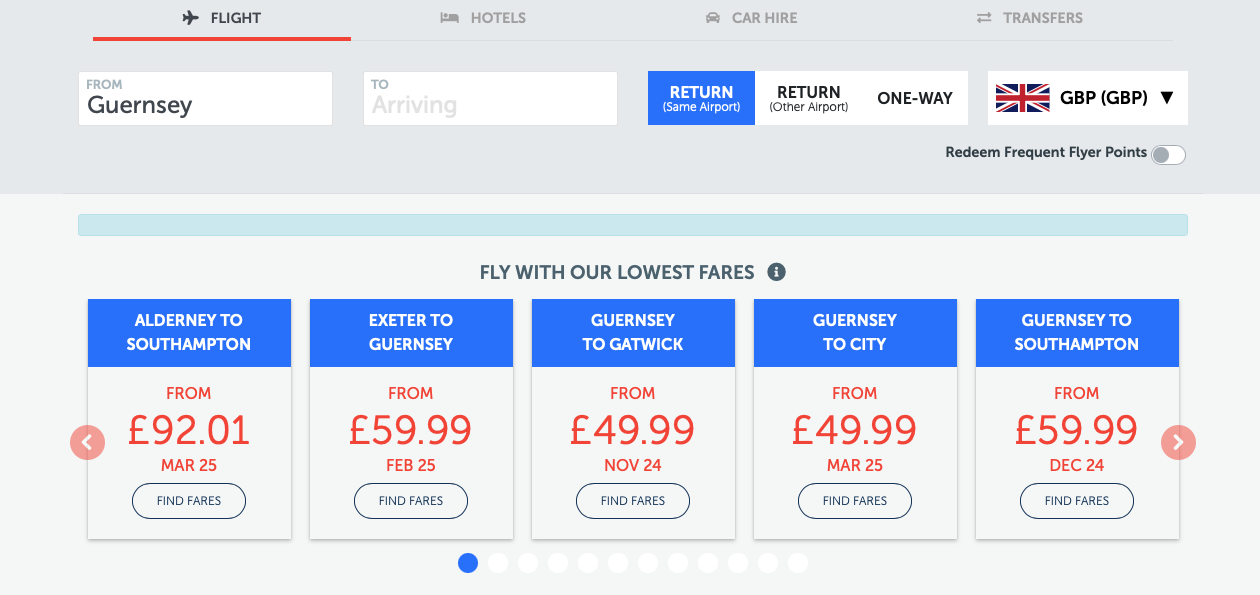


Being States-owned is right for Aurigny, says the man in charge.
Speaking about a range of topics, in an exclusive interview with Express, CEO Nico Bezuidenhout gave familiar comparisons with the Isle of Man to explain his position.
His interview covered a range of topics, including why the airline doesn't have to make a profit each year - because reducing its losses is deemed more important that making money.
That is a reflection of the States-interest in the airline, for the wider community he said.

Pictured: Nico Bezuidenhout has been CEO of Aurigny since 2020.
"There's a narrative, that State owned businesses by default are useless. Now, I disagree with that notion.
"If you look at some of the world's leading airlines, Emirates, for example, or Qatar, they're State-owned and it doesn't make them by default, ineffective. In as far as Aurigny is concerned, I think that we need to remember that Guernsey is a very small market, 65,000 people - that's an average town size that typically wouldn't have an airline dedicated to it. During the course of the pandemic, the value of owning Aurigny was clearly illustrated.
"Now, having said all of that, the criticism that Aurigny has had historically was the fact that it's lost money. Now, of my key mandates provided to me by the States, my second most important objective is stop losing money. The number one objective is protect lifeline routes, number two is stop losing, not make money, stop losing money, and the number three objective is whatever profits you make, pass that back into lower fares or better connectivity to the islands. Those are my three objectives."
While some readers may be aghast that making money is only third on Aurigny's list of priorities, Mr Bezuidenhout thinks that is correct for a States-owned airline.
"I think that it's perfectly legitimate for the States, given that dependence and the importance that we have as an island on air connectivity, to have some form of say and control over the asset, but then also to make sure the asset doesn't lose money.

Pictured: Aurigny operates lifeline links between Guernsey, Alderney, and the UK, as well as numerous other routes.
"Now, last year, for example, we achieved record profitability and record turnover. (Aurigny) carried more passengers than ever before to more destinations than ever before, and our punctuality rate was in top five in the UK. So every box in that regard was ticked, and importantly below RPI increases on fares."
If the States of Guernsey didn't own Aurigny, the biggest risk has always been implied as the loss of the Gatwick landing slots, and the loss of the lifeline routes between Alderney and Guernsey and Southampton, and the London hub.
Those who see benefits in the States selling Aurigny may wonder if air fares would drop if competition was welcomed on those lifeline routes, or the other routes.
But Mr Bezuidenhout suggested that relinquishing States ownership of the airline could see fares rise, with no guarantee of any competition arising on any routes to or from the Bailiwick.
"For example, the Isle of Man...they're in a situation where there's a low cost carrier that now controls 60% of that market. But the interesting fact is, when you go to the air travel inflation index that the Isle of Man publishes, you'll see that their air fares increased by 50% between 2019 and 2024. Ours (increased) by 24%, and that follows on that the States have told me that they don't want profits.
"They don't want losses, but they don't want profits, so whatever profits you make, reduce the cost of airfares, and that's what we've done. Now, if you didn't own an airline, you can't do that. You can't dictate a dividend policy with private enterprise. You can't say to a private enterprise to focus on Gatwick or this or that airport. You're at the whim of what that airline says they will do."

Pictured: Aurigny's fare offerings on Wednesday 2 October 2024.
While making money isn't the number one priority for Aurigny, Mr Bezuidenhout is tasked with directing any profits back into the airline - specifically into reducing air fares or widening services.
While acknowledging local air travel is not cheap, he insists that air fares - relatively speaking - are no more expensive in 2024 than they were forty years ago.
"(In) 1984 the lowest fare between Guernsey and Gatwick is £49.99. Our lowest fare right now between Guernsey and Gatwick is £59.99. Earlier in the year in the launch phase to London City we had fares at £29.99. Inflation adjusted, the entry level fee, if it was £49.99 in 1984, it's meant to be £130 pounds now, and it's far from.
"If you look at the first seven days in October, the lowest fare available on Aurigny (to Gatwick) starts at £69.99 and it goes up to £109.99.
Asked to specifically clarify how many seats are available on flights from Guernsey to London Gatwick at those fares, Mr Bezuidenhout said there would be two or three seats available at £49.99 per flight, and around five to ten per flight at £109.99.
"They will go first," he acknowledged. "But right now, you can still get for (this week) a fare for £69.99 into London.
"When I compare that to to the Isle of Man - a low cost carrier in that case - they operate two flights a day between the Isle of Man and Gatwick. When you check online, the lowest fare you can get, and to try and make it comparable I'll assume that you at least need to be able to use the overhead storage, their lowest fares start at £84 pounds to £141 pounds from the Isle of Man to Gatwick, and that's for two flights a day. That lowest fare is available for the flight that lands at twenty past nine at night. So you've got no chance of doing a same day return and you're in a hotel for two nights.
"There's another regional carrier that operates between the Isle of Man and two London ports. The fares start between £140 pounds up to £280, again for next week for the same period, because again you can't do a same day return. So relatively speaking, the cost of air travel is not more expensive here compared to the Isle of Man, for example.
"Now it is true that in a market like Jersey, for example, where competitive tensions mean that British Airways and EasyJet are at each other's throats, they drive price points down. Whether that's sustainable is, of course, a different debate, and to what extent airport fees, subsidies etc, play a role, is an unknown factor.
"If I look at, in the case of Guernsey, our airport fees, Guernsey airport is not subsidised by the States, and therefore the charges that they charge are not subsidised either. So for an average passenger coming from Gatwick the average fare paid across a full year is between £90 and £100 for a one way fare. And of course, there are some passengers who end up going over Easter weekend and you end up paying £200. And there's some who paid £50, but the average is £90.
Pictured: Aurigny's entire infrastructure is based at Guernsey Airport which means it contributes £20m to the island's economy each year itself.
"Now, if you're leaving from Gatwick to come to Guernsey, out of your £90, £45 goes to Gatwick Airport, Guernsey Airport, and the UK Government in air passenger duties, leaving us with £45 to pay everything else for actually delivering that service.
"You can also see that when we sold tickets at £29.99 we were losing money hand over fist on those specific sales, but of course, we would make it up on other transactions.
"So I think that in the end, there's a cost associated to delivering a service in a small scale business, and that cost would be the same no matter which carrier. If you replaced Aurigny with Aurigny #2 or something else owned by somebody else, your cost isn't going to change. The cost of the aircraft is the same, the cost of the fuel is the same, the airport charges are the same. The only difference is that because this government owns Aurigny, Aurigny is based here, so £20m per year gets spent in the economy on this island, to employ people, to rent offices, to pay airport fees, to pay interest and tax, social security, etc. That's £20m per year that comes back into the economy, bearing in mind that Aurigny's turnover is only about £60m.
"So in the end, is it more expensive to travel between an island location and a bigger airport? Yes it is. Unfortunately, that's the reality, but that's the scale that we've got.
"It's also the level of backup that we want or don't want. If we changed the remit and we said, we're okay with three flights a day (to Gatwick), like the Isle of Man. If the society says we only want five flights a day, fine. We can pare that back and we can do five flights a day.
"Whether that's useful or not for the economy? There's another question."
In our exclusive series of articles this week, Nico Bezuidenhout will explain why his staff are Aurigny's strength.
He'll also look ahead to 2025 and what that might bring for Aurigny.
A podcast of the full interview will be published on Friday.
EXCLUSIVE: Some routes to be dropped
EXCLUSIVE: Aurigny's boss on regaining your trust
Comments
Comments on this story express the views of the commentator only, not Bailiwick Publishing. We are unable to guarantee the accuracy of any of those comments.